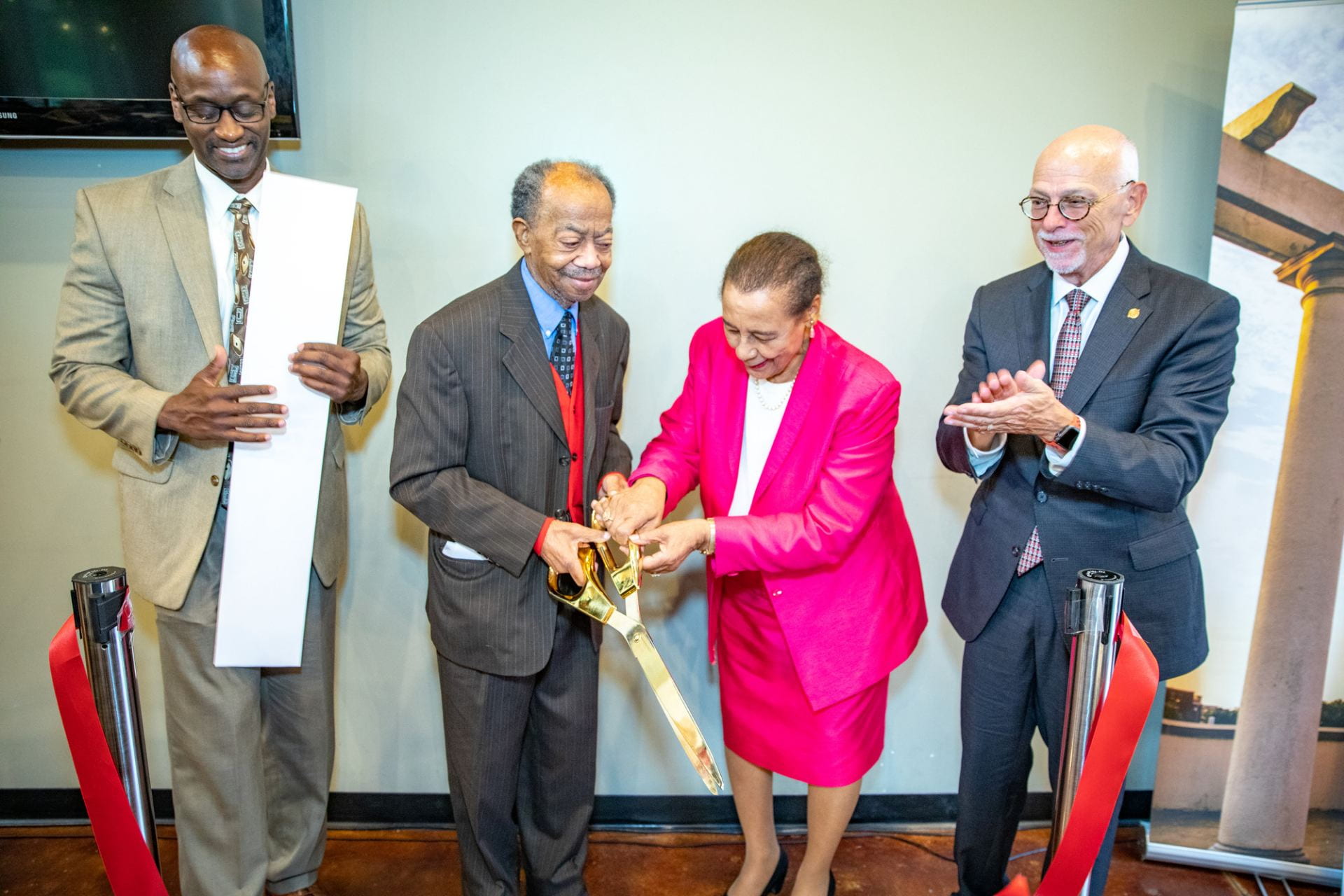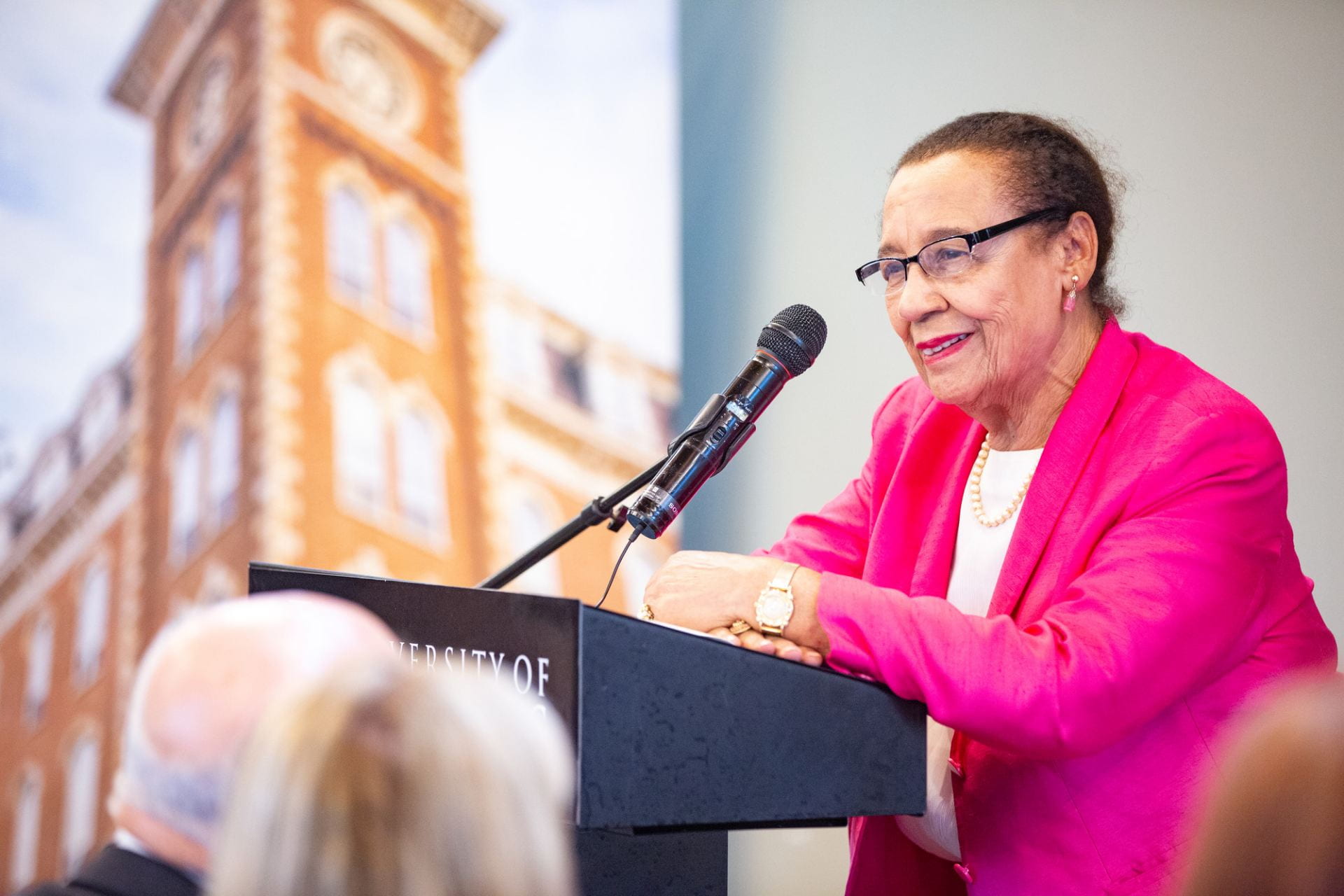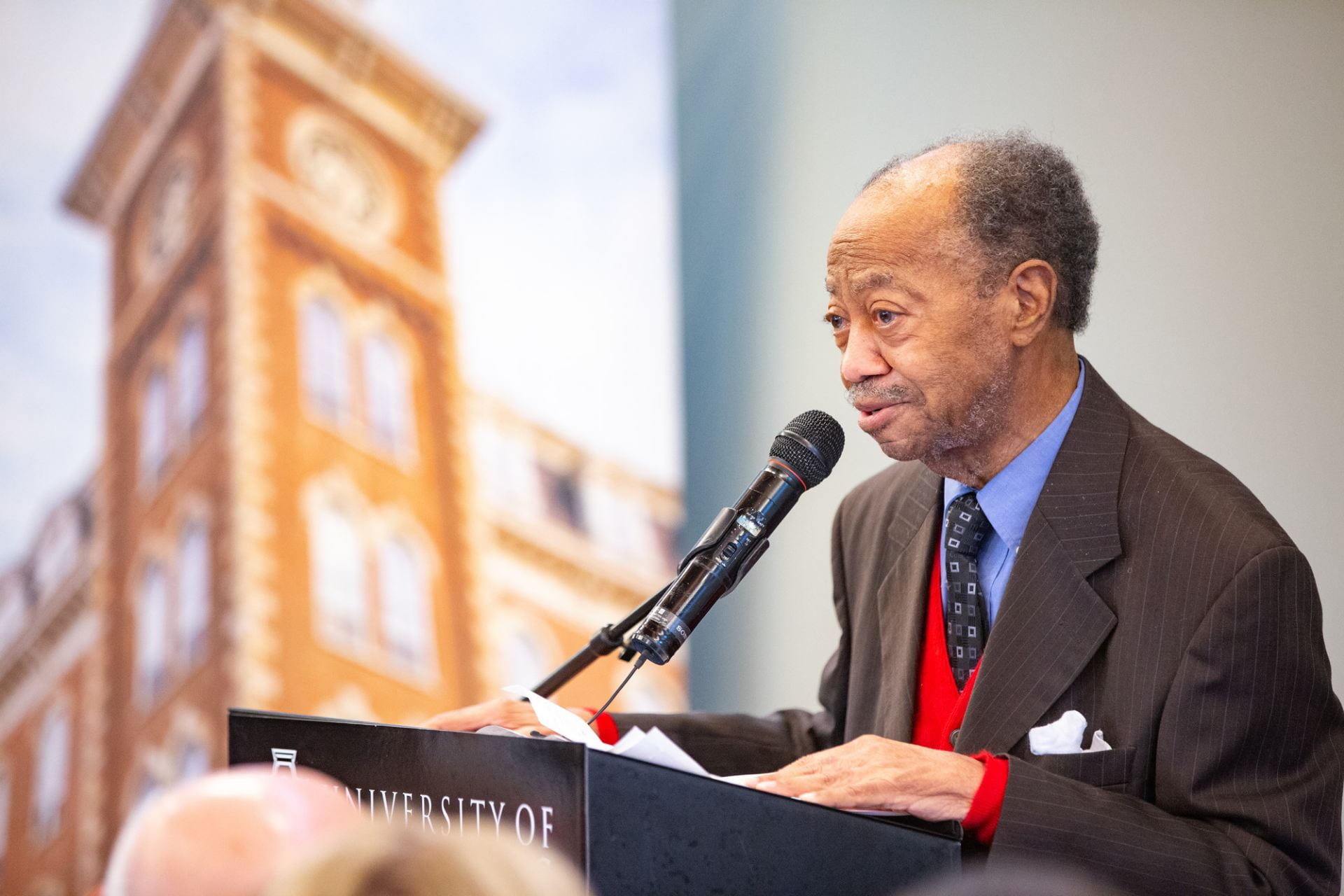
“We have two great heroes here today,” said Chancellor Joe Steinmetz during the dedication of Clark and Morgan halls on September 13. Two residence halls in the Northwest Quad were named to honor University of Arkansas professors Margaret Clark and Gordon Morgan.
The first two African American professors at the University of Arkansas both began teaching in 1969. “Combined, Clark and Morgan put in 72 years on this campus,” Steinmetz said. “72 years of nurturing students, mentoring students, teaching students.” Clark initially taught world languages while Morgan was hired as an assistant professor of sociology.
The U of A Board of Trustees approved the namings on Jan. 31, at the board’s regular meeting on the Univerity of Arkansas for Medical Sciences campus in Little Rock. Clark and Morgan are described as making the university a more welcoming place and a better place to live, study, and learn.
Bill Kincaid, Clark’s former student who currently works at the University of Arkansas as an associate general counsel, remarked on Clark’s energy, optimism, and involvement with her community. “Margaret’s optimism and community involvement and lifelong passion for teaching, kindness, and wisdom are what we aim to foster in all of our graduates,” Kincaid said. He explained how Clark made an instant connection with anyone in her classroom.
“Her passion for language, culture, reflects who she is and what she believes,” said Freddie Bowles, another one of Clark’s former students and a current associate professor. Bowles described Clark as a professional and stylish woman who loved helping shape academic success and careers. “Her guiding influence is especially felt in language education,” Bowles said. “She is special, beyond special.” Clark poured her heart out into everything she did on campus, and her efforts were recognized by all those around her.
Dan Ferritor, chancellor emeritus, made remarks about his time as chancellor while Morgan and Clark were teaching. While there are 295 buildings on campus, only 86 are named. 84 are named after donors, while only two are named after people who have served the University of Arkansas, he said. Kimpel Hall and Carnall Hall were the only two before Clark and Morgan Halls were named.
 “We are not only doubling the number of buildings that are named for faculty, but we are recognizing two individuals who have dedicated their entire lives and careers to serving the world on this campus,” Ferritor said. “I think that makes today so very, very special.”
“We are not only doubling the number of buildings that are named for faculty, but we are recognizing two individuals who have dedicated their entire lives and careers to serving the world on this campus,” Ferritor said. “I think that makes today so very, very special.”
Ferritor explained his relationship with Morgan, describing him as an amazing teacher. “There isn’t a single faculty member that I remember that taught more classes than Gordon did in one semester,” Ferritor said. Morgan’s door was always open for students who needed it. He would lend a caring ear to someone who needed a friend or give a little money for lunch to a hungry student.
Ferritor explained Morgan as a selfless teacher who valued the relationships he had with students. “It’s hard to sum up what Gordon means to students,” Ferritor said. By working every day in every way to help students reach their full potential, Morgan was a rock in many students’ lives. Even at 80 years of age, Morgan “was a cool dude,” Ferritor said.
“I began writing when I was quite young,” Morgan said. “Things excited me then, and they still do.” One of Morgan’s books, “Edge of Campus: A Journal of the Black Experience at the University of Arkansas”, explains his triumphs and setbacks in his on-campus experience. Growing up in Mayflower, Arkansas, Morgan says he lived in an area that was typical of the old south.
Morgan ended his speech with how gracious he was to receive this recognition. “I enjoyed the University of Arkansas for 43 years,” Morgan said. “Thank you kindly for this recognition at the university.”
Both Morgan and Clark knew each other while attending Arkansas Agricultural, Mechanical & Normal College (AM&N) in Pine Bluff. He earned “graduation honors, though they were not as high as those earned by Dr. Margaret Clark,” Morgan said. “We had a few classes together… I didn’t like Margaret Clark,” Morgan joked. “No matter how hard I tried, if she was in the class, she got the A’s.”
Clark said she is still in the process of registering that there is a building on campus that is named for her.
“When I first heard of this (naming), tears flooded my eyes,” Clark said. “They were tears of disbelief, gratitude and joy.”
After working for the University of Arkansas for 38 years, founding the Phi Alpha Omega graduate chapter of Alpha Kappa Alpha sorority, and empowering women through her hard work, Clark explained that the University had left its mark on her life as well.
The University of Arkansas gave her opportunities, education, employment and “a lot of friends,” Clark said, “Friends who have come as a result of being colleagues. Friends that have come as a result of being my students.”
When asked about the recognition that Clark had received, the current president of the Phi Alpha Omega graduate chapter of Alpha Kappa Alpha, Angela Mosley-Monts, said that is “an honor for me as a former student of hers and as her sorority member that this honor has been bestowed upon her.”
For contributing so much to the history of the University of Arkansas, Steinmetz thanked Clark and Morgan one final time. “This is our way of saying thanks for all you have done,” Steinmetz said.

Margaret Clark began her teaching career at the University of Arkansas in 1969 after earning a master’s degree in 1968. She initially taught world languages including French while working on a doctorate in education. She was appointed an assistant professor of secondary education in 1972 in the College of Education and Health Professions. She earned her Doctor of Education in 1978. She became an associate professor of secondary education in 1994.
She has served on the Board of Directors of the Arkansas Alumni Association and the Washington County Historical Society and was a member of the Arkansas Division of the American Association of University Women. She also served as the first president of the Phi Alpha Omega chapter of the Alpha Kappa Alpha Sorority Inc.
Among other honors, she has been awarded the Silas Hunt Legacy Award, the Outstanding Faculty Award and the Martin Luther King Jr. Lifetime Achievement Award. She retired in 1998, taking emerita status but remaining active in community affairs.

Gordon Morgan was hired as an assistant professor in the Department of Sociology in 1969 and climbed the tenure ladder to associate professor, full professor and then the rank of University Professor.
He is a member of the Black Alumni Association and the Arkansas Alumni Association.
Morgan received the Silas Hunt Legacy Award, a National Endowment for the Humanities Teaching Fellowship and a Ford Foundation Fellowship, among other honors. He received the J. William Fulbright Distinguished Alumni Award in 2006.
In 1990, Morgan and his wife, Izola Preston, wrote a seminal book, The Edge of Campus: A Journal of the Black Experience at the University of Arkansas, examining the first 40 years of campus life since desegregation began at the U of A in 1948.
He and his wife also established the Gordon Morgan Family Scholarship for minority students at the U of A. He retired and took emeritus status in 2012.
